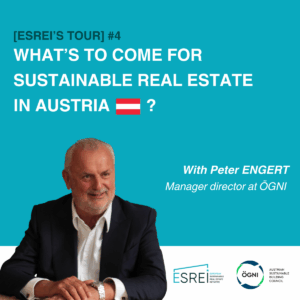As fate would have it, the three-year anniversary of the European research programme launched by the OID, ESREI (European Sustainable Real Estate Initiative), coincides with the European Parliament elections. During the campaign, the current environmental challenges facing the real estate sector were highlighted: energy transition and independence, renovation of buildings, preservation of biodiversity, the transition to a circular economy, etc. All these issues are above all cross-border and require international cooperation. How can we work together on these issues? That’s what the ESREI programme is all about?
- ESREI in short
ESREI stands for European Sustainable Real Estate Initiative and is a research programme launched by the OID in 2021. Indeed, since its creation, OID has worked on and published many regulations at both French and European level, for example with the European Taxonomy. However, as European regulations are multiplying, the need for a European vision became essential. Therefore, the OID took the leap in 2021 and launched ESREI. As of today, 10 sponsors support the programme: AEW, Amundi Asset Management, Axa investment managers, BNP Paribas Real Estate, CBRE, Forvis Mazars, Ivanhoé Cambridge, La Française REM, OFI invest and Pimco Prime Real Estate. We would like to thank them for their support.
2. The importance of multi-sector expertise for the ecological transition
There are many issues linked to the ecological transition of the real estate sector at European level: energy, decarbonisation, adaptation to climate change, biodiversity, waste management, etc. One of the strengths of the ESREI programme is that the OID team is made up of people from different working groups:
- Marie Andrieux, project manager and steering of ESREI, worked on the Adaptation topic
- Juliette Daire, senior project officer, is also working in the Responsible Finance Working Group on non-financial reporting issues.
- Geoffroy Gourdain, senior project officer, is responsible for energy, carbon and green value issues
- Occasional assistance is provided by analyst. Céline Lambert, a final-year student at Sciences Po Paris, was also attached to the OID’s Training Department, which gives her an overall view of our issues.

Fig.1: ESREI team today
3) Working together: the strength of the network
The second strength of the programme lies in the conviction that the ecological transition requires a wide range of stakeholders. ESREI’s ambition is to support a network of European sustainability players. Identifying partners throughout Europe is therefore a strong goal. Creating a network working together on ESG issues for real estate strongly help the transition towards more sustainable real estate. We are therefore in regular contact with a number of key players in Europe, and we thank them for their time and expertise: EPRA, INREV, Build Better Partnership, DGNB, OFATE, Climate Adaptation Services, Global Alliance for Buildings and Construction, …
The ESREI programme also aims to promote synergies between the various international activities of the OID, and the multidisciplinary issues that these addresses. At association level, the Responsible Finance Unit is working on several European regulations (EU Green Taxonomy, SFDR Regulation, CSRD Directive). Thanks to the support of ESREI, the Taxonomy guide has been translated in English. The OID’s international activities also include the secretariat of the Adaptation WG of the Global Alliance for Buildings and Construction, the work of the R4RE team on climate resilience in Europe, and the opening of the Energy Performance Barometer to other European countries, as well as its English translation.
4) What publications have been produced after three years?
Since 2021, the programme has produced a wide range of resources. These fall into four categories:
- Numerous articles appear regularly on the OID website. The most recent topics covered were the European elections, the BACS decree and the CSRD directive,
- Regulatory newsletters are regularly sent to sponsors, covering European news for the building sector on all sustainability-related subjects (energy, responsible finance, biodiversity, carbon, etc.),
- Designed to lay out overviews of the sustainable real estate sector, country fact sheets are regularly published and updated. Most European countries are covered. So far, 19 have been posted. The last country to be analyzed is Hungary and will be published at the end of 2024,

Fig. 2: Examples of the first two pages of a country factsheet
- Finally, pan-European studies are regularly published on a variety of subjects, including:
- Overview of sustainable real estate issues and regulations (in 10 European countries, with an updated version on 20 countries to come)
- Energy Performance Certificates (four studies published, the executive summary of the latest can be found here),
- The BACS decree (study to be published in September 2024).
These studies analyse and compare the application of European directives in several EU countries, in order to support real estate players with pan-European portfolios.

Fig. 3: The first three studies on Energy Performance Certificates
In conclusion, we are delighted to be celebrating the ESREI programme’s three years of existence. This research programme tackles the many challenges of the ecological transition in an ambitious and holistic way, and we are proud of our achievements so far.
We would like to extend our warmest thanks to the ten sponsors of the programme who make our work possible: AEW, Amundi Asset Management, Axa investment managers, BNP Paribas Real Estate, CBRE, Forvis Mazars, Ivanhoé Cambridge, La Française REM, OFI invest and Pimco Prime Real Estate.
- To follow our news, check out the programme’s LinkedIn page.
- If you would like to find out more about us, please contact us at esrei@o-immobilierdurable.fr


